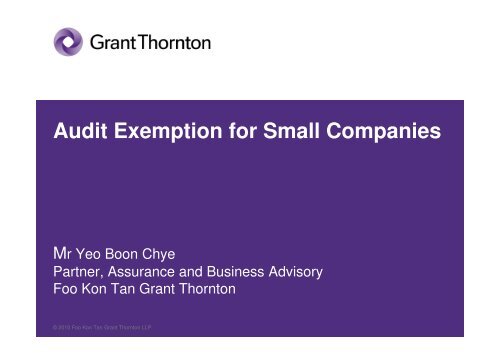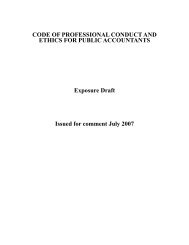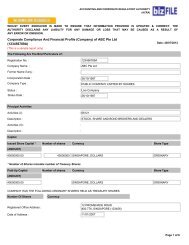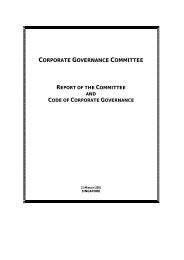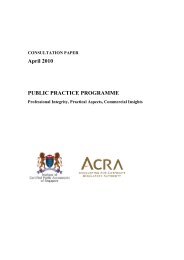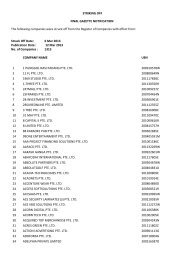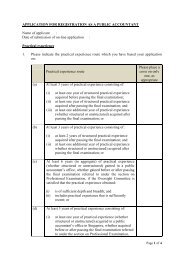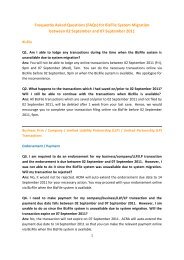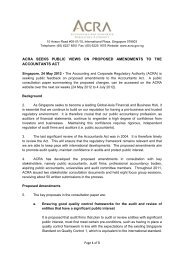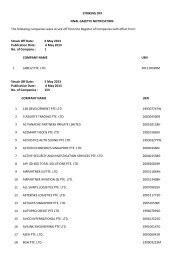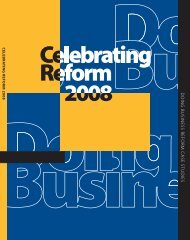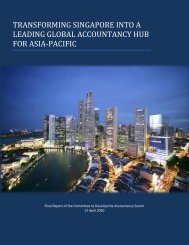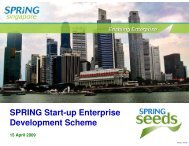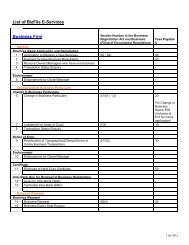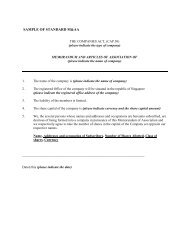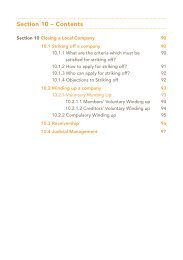Audit Exemption for Small Companies - Accounting and - ACRA
Audit Exemption for Small Companies - Accounting and - ACRA
Audit Exemption for Small Companies - Accounting and - ACRA
You also want an ePaper? Increase the reach of your titles
YUMPU automatically turns print PDFs into web optimized ePapers that Google loves.
<strong>Audit</strong> <strong>Exemption</strong> <strong>for</strong> <strong>Small</strong> <strong>Companies</strong><br />
Mr Yeo Boon Chye<br />
Partner, Assurance <strong>and</strong> Business Advisory<br />
Foo Kon Tan Grant Thornton<br />
© 2010 Foo Kon Tan Grant Thornton LLP
Agenda<br />
• Users of financial statements<br />
• Purpose <strong>and</strong> reason <strong>for</strong> a statutory audit<br />
• Value of an audit <strong>for</strong> <strong>Small</strong> Medium Enterprises<br />
(“SMEs”)<br />
• <strong>Audit</strong> exemption<br />
• Exempt Private <strong>Companies</strong> (“EPCs”)<br />
• Statistics<br />
• Services small companies can get from<br />
professional firms<br />
© 2010 Foo Kon Tan Grant Thornton LLP
Users of financial statements<br />
suppliers <strong>and</strong> trade<br />
creditors<br />
customers<br />
employees<br />
existing <strong>and</strong><br />
potential investors<br />
government <strong>and</strong><br />
its agencies<br />
Users of<br />
financial statements<br />
- satisfy different needs <strong>for</strong> in<strong>for</strong>mation<br />
lenders <strong>and</strong><br />
financial<br />
institutions<br />
shareholders<br />
© 2010 Foo Kon Tan Grant Thornton LLP
Purpose <strong>and</strong> reason <strong>for</strong> a statutory audit<br />
• a statutory audit provides benefits to companies,<br />
regulators, shareholders <strong>and</strong> other stakeholders<br />
– a deterrent to fraud <strong>and</strong> money laundering<br />
– a stimulus to openness <strong>and</strong> transparency<br />
– a highly effective driver <strong>for</strong> the promotion of<br />
good corporate governance<br />
– Increase in the reliability of accounts <strong>and</strong> thus<br />
their value to all users<br />
– protection of the wider public interest<br />
© 2010 Foo Kon Tan Grant Thornton LLP
Purpose <strong>and</strong> reason <strong>for</strong> a statutory audit (cont’d)<br />
• regulatory requirements; the <strong>Companies</strong> Act, Cap.<br />
50 (“the Act”) requires<br />
– the directors of the company to lay be<strong>for</strong>e the<br />
company at its AGM a duly audited profit <strong>and</strong><br />
loss accounts <strong>and</strong> balance sheet made up to a<br />
date not more than six months be<strong>for</strong>e the date of<br />
the AGM<br />
– an auditor to examine the company’s accounting<br />
records <strong>and</strong> financial statements <strong>and</strong> to obtain all<br />
the in<strong>for</strong>mation <strong>and</strong> explanations needed so as to<br />
enable him to <strong>for</strong>m an opinion<br />
© 2010 Foo Kon Tan Grant Thornton LLP
Value of an audit <strong>for</strong> <strong>Small</strong> <strong>and</strong> Medium Enterprises<br />
(“SMEs”)<br />
• provides credibility of published in<strong>for</strong>mation to users of<br />
financial statements, eg.<br />
– to facilitate the payment of taxes on time <strong>and</strong> accurately,<br />
thereby avoiding penalties, interest <strong>and</strong> investigations<br />
– improvements to the funding of businesses<br />
– play a key role in the raising of finance <strong>and</strong> capital<br />
• improve controls, deter <strong>and</strong> detect material fraud <strong>and</strong> error<br />
• demonstrate good corporate citizenship<br />
• other spin-off benefits of an audit such as advice on the<br />
structure <strong>and</strong> operations of systems<br />
© 2010 Foo Kon Tan Grant Thornton LLP
<strong>Audit</strong> exemption<br />
• audit exemption applicable to<br />
– dormant companies<br />
– small exempt private companies (“EPCs”)<br />
© 2010 Foo Kon Tan Grant Thornton LLP
Dormant companies<br />
- definition<br />
• a company that has no accounting transactions <strong>for</strong><br />
the financial year in question or has not started<br />
business since its corporation<br />
© 2010 Foo Kon Tan Grant Thornton LLP
Exempt Private <strong>Companies</strong> (“EPCs”)<br />
- definition<br />
• a private company in the shares of which no<br />
beneficial interest is held directly or indirectly by<br />
any corporation <strong>and</strong> which has not more than 20<br />
members<br />
OR<br />
• any private company, being a private company that<br />
is wholly-owned by the Government, which the<br />
Minister, in the national interest, declares by<br />
notification in the Gazette to be an exempt private<br />
company<br />
© 2010 Foo Kon Tan Grant Thornton LLP<br />
Ref: <strong>Companies</strong> Act Section 4(1)
<strong>Audit</strong> exemption<br />
- criteria <strong>for</strong> EPCs to be exempted from audit<br />
• financial period commences on or after 15 May 2003 but<br />
be<strong>for</strong>e 1 June 2004 <strong>and</strong> the company’s revenue is not more<br />
than S$2.5 million<br />
OR<br />
• financial period commences on or after 1 June 2004 <strong>and</strong><br />
the company’s revenue is not more than S$5.0 million<br />
OR<br />
• *any company including an EPC that is dormant <strong>for</strong> the<br />
financial year commencing on or after 15 May 2003<br />
* not subsidiaries of listed companies<br />
Ref:<br />
© 2010 Foo Kon Tan Grant Thornton LLP
<strong>Audit</strong> exemption<br />
- criteria <strong>for</strong> EPCs to be exempted from audit<br />
• proper accounting records are maintained<br />
• the financial statements are prepared according to<br />
Singapore Financial Reporting St<strong>and</strong>ards (FRS) <strong>for</strong><br />
submission to IRAS<br />
• an audit is not requested by<br />
– shareholders holding not less than 5% interest<br />
in the company’s share capital; or<br />
– <strong>ACRA</strong>; or<br />
– other government authorities/financial<br />
institutions/creditors<br />
© 2010 Foo Kon Tan Grant Thornton LLP
<strong>Audit</strong> exemption<br />
• audit exemption<br />
– remove the statutory burdens <strong>and</strong> costs on<br />
smaller businesses<br />
– provide an efficient <strong>and</strong> pro-business<br />
environment <strong>for</strong> small businesses<br />
• the profit <strong>and</strong> loss accounts or consolidated<br />
accounts <strong>and</strong> balance sheet DO NOT have to be<br />
audited<br />
• copies of an auditor’s report DO NOT have to be<br />
presented at the AGM<br />
© 2010 Foo Kon Tan Grant Thornton LLP
<strong>Audit</strong> exemption<br />
• however, the Registrar may require the company<br />
to submit audited accounts <strong>and</strong> the auditor’s<br />
report, to the Authority if<br />
– the Authority believes that there has been a<br />
breach of s199 (relating to accounting records<br />
<strong>and</strong> system of control) <strong>and</strong> s201 (relating to the<br />
accounts <strong>and</strong> director’s reports) of the Act; or<br />
– it is otherwise in the public interest to do so<br />
© 2010 Foo Kon Tan Grant Thornton LLP<br />
S205(d) of the Act
Annual Return (AR) filing by EPC<br />
• need not attach EPC certificate or the Statement by EPC<br />
exempting them from audit requirements<br />
• professional firms filing on behalf of companies may<br />
continue to require hardcopies certificates as evidence of<br />
compliance <strong>and</strong> keep these <strong>for</strong> records purposes<br />
• insolvent EPCs <strong>and</strong> EPCs that are required by law to file<br />
financial statements with <strong>ACRA</strong> will file in Extensible<br />
Business Reporting Language (“XBRL”) <strong>for</strong>mat<br />
• solvent EPCs are exempted from filing their financial<br />
statements with <strong>ACRA</strong><br />
© 2010 Foo Kon Tan Grant Thornton LLP
Annual Return (AR) filing by EPC (cont’d)<br />
• full set of financial statements<br />
– report <strong>and</strong> statement of the directors<br />
– balance sheet <strong>and</strong> profit <strong>and</strong> loss account<br />
– notes to the accounts<br />
• statement by the directors<br />
– confirming that the company is either dormant or a small<br />
exempt private company<br />
– confirming that no notice has been received from the<br />
members to require an audit to be done<br />
– confirming that the accounting <strong>and</strong> other records have<br />
been kept in accordance with the <strong>Companies</strong> Act<br />
© 2010 Foo Kon Tan Grant Thornton LLP
<strong>ACRA</strong> Research Report<br />
- Key facts <strong>and</strong> trend of Singapore’s Public Accountancy<br />
Profession <strong>and</strong> Market, July 2008<br />
© 2010 Foo Kon Tan Grant Thornton LLP
<strong>ACRA</strong> Research Report<br />
- Key facts <strong>and</strong> trend of Singapore’s Public Accountancy<br />
Profession <strong>and</strong> Market, July 2008<br />
• 70% of the private companies in Singapore are<br />
EPCs. Amongst them, only those with annual<br />
revenue equal or less than $5.0 million are audit<br />
exempted<br />
• of the companies that filed audited financial<br />
statements with <strong>ACRA</strong> between 2003 <strong>and</strong> 2007,<br />
companies audited by small accounting entities<br />
dropped from over 75,000 in 2004 to about 41,000<br />
in 2007<br />
© 2010 Foo Kon Tan Grant Thornton LLP
<strong>ACRA</strong> Bizfile<br />
- Number of EPCs that submitted audited accounts<br />
Exempt Private <strong>Companies</strong><br />
250,000<br />
200,000<br />
150,000<br />
100,000<br />
50,000<br />
-<br />
2003 2004 2005 2006 2007<br />
© 2010 Foo Kon Tan Grant Thornton LLP<br />
Number of EPC<br />
EPC that submitted audited accounts<br />
EPC that submitted audited accounts <strong>and</strong> have revenue less than S$5 million
<strong>Audit</strong> exemption<br />
Benefits<br />
Costs<br />
© 2010 Foo Kon Tan Grant Thornton LLP
Costs vs benefits<br />
Consider:<br />
• business needs<br />
• the users of financial statements eg.<br />
financial institutions, creditors<br />
• other professional services eg.<br />
review of financial statements,<br />
agreed upon procedures<br />
© 2010 Foo Kon Tan Grant Thornton LLP
Services small companies can get from professional<br />
firms<br />
Other services<br />
- review engagements /<br />
interim review engagements<br />
- agreed upon procedures<br />
engagement<br />
In accordance to<br />
SSRE 2400 (not the auditor of an entity)<br />
SSRE 2410 (the auditor of an entity)<br />
SSRS 4400<br />
- compiling financial<br />
in<strong>for</strong>mation<br />
SSRS 4410<br />
© 2010 Foo Kon Tan Grant Thornton LLP
Services small companies can get from professional firms<br />
- review engagement<br />
• review engagement (SSRE 2400)<br />
– obtain sufficient appropriate evidence primarily<br />
through inquiry <strong>and</strong> analytical procedures to be<br />
able to draw conclusions<br />
– document matters which are important in<br />
providing evidence to support the review report<br />
– it provides a moderate level of assurance<br />
– expressed in the <strong>for</strong>m of negative assurance<br />
© 2010 Foo Kon Tan Grant Thornton LLP
Services small companies can get from professional firms<br />
- review engagement report<br />
• a review engagement report<br />
– comprises a complete set of financial statements<br />
in accordance with FRS (balance sheet, income<br />
statement, statement of changes in equity,<br />
cashflow statement)<br />
– the preparation of the financial statements are<br />
the responsibility of the company's management<br />
© 2010 Foo Kon Tan Grant Thornton LLP
Services small companies can get from professional firms<br />
- review engagement report (cont’d)<br />
• provides moderate assurance as opposed to an<br />
opinion ie. “…nothing has come to our attention<br />
that causes us to believe that the accompanying<br />
financial statements are not presented fairly, in all<br />
material respects, in accordance with Financial<br />
Reporting St<strong>and</strong>ards.”<br />
• inquiry procedures with analytics<br />
• no test of transactions unless warrant<br />
© 2010 Foo Kon Tan Grant Thornton LLP
Services small companies can get from professional firms<br />
- interim review engagement<br />
• interim review engagement (SSRE 2410)<br />
– enable the auditor to express a conclusion whether<br />
anything has come to the auditor’s attention that<br />
causes the auditor to believe that the interim financial<br />
in<strong>for</strong>mation is not prepared, in all material respects, in<br />
accordance with an applicable financial reporting<br />
framework<br />
– may bring significant matters affecting the interim<br />
financial in<strong>for</strong>mation to the auditor’s attention, but it<br />
does not provide all of the evidence that would be<br />
required in an audit<br />
© 2010 Foo Kon Tan Grant Thornton LLP
Services small companies can get from professional firms<br />
- interim review engagement report<br />
• an interim review engagement report<br />
– comprises financial statements as per that of a<br />
review engagement report (balance sheet,<br />
income statement, statement of changes in<br />
equity, cashflow statement)<br />
– the preparation of the financial statements are<br />
the responsibility of the company's management<br />
© 2010 Foo Kon Tan Grant Thornton LLP
Services small companies can get from professional firms<br />
- interim review engagement report (cont’d)<br />
“A review of interim financial in<strong>for</strong>mation consists of<br />
making inquiries, primarily of persons responsible <strong>for</strong><br />
financial <strong>and</strong> accounting matters, <strong>and</strong> applying<br />
analytical <strong>and</strong> other review procedures. A review is<br />
substantially less in scope than an audit conducted in<br />
accordance with Singapore St<strong>and</strong>ards on <strong>Audit</strong>ing<br />
<strong>and</strong> consequently does not enable us to obtain<br />
assurance that we would become aware of all<br />
significant matters that might be identified in an audit.<br />
Accordingly, we do not express an audit opinion.”<br />
© 2010 Foo Kon Tan Grant Thornton LLP
Services small companies can get from professional firms<br />
- agreed upon procedures engagement<br />
• agreed upon procedures engagement (SSRS 4400)<br />
– per<strong>for</strong>m certain procedures on individual items of<br />
financial data (eg. accounts payable/receivable,<br />
purchases from related parties), a financial statement<br />
(eg, a balance sheet) or even a complete set of financial<br />
statements<br />
– provides a report of factual findings<br />
– no opinion is expressed<br />
– report is restricted to those parties that have agreed to<br />
the procedures<br />
© 2010 Foo Kon Tan Grant Thornton LLP
Services small companies can get from professional firms<br />
- agreed upon procedures engagement report<br />
• states the list of the specific procedures per<strong>for</strong>med<br />
eg.<br />
“The procedures were per<strong>for</strong>med solely to assist you in evaluating the<br />
validity of the accounts payable <strong>and</strong> are summarised as follows:<br />
1. We obtained <strong>and</strong> checked the addition of the trial balance of accounts<br />
payable as at 31 December 2008 prepared by ABC Pte Ltd, <strong>and</strong> we<br />
compared the total to the balance in the related general ledger<br />
account.<br />
2. We compared the attached list (not shown in this example) of major<br />
suppliers <strong>and</strong> the amounts owing at 31 December 2008 to the related<br />
names <strong>and</strong> amounts in the trial balance.<br />
3. We obtained suppliers' statements or requested suppliers to confirm<br />
balances owing at 31 December 2008.”<br />
© 2010 Foo Kon Tan Grant Thornton LLP
Services small companies can get from professional firms<br />
- agreed upon procedures engagement report (cont’d)<br />
• provides a report of factual findings<br />
eg.<br />
We report our findings below:<br />
(a) With respect to item 1 we found the addition to be correct<br />
<strong>and</strong> the total amount to be in agreement.<br />
(b) With respect to item 2 we found the amounts compared to<br />
be in agreement.<br />
(c) With respect to item 3 we found there were suppliers'<br />
statements <strong>for</strong> all such suppliers.<br />
© 2010 Foo Kon Tan Grant Thornton LLP
Services small companies can get from professional firms<br />
- agreed upon procedures engagement report (cont’d)<br />
“… Because the above procedures do not<br />
constitute either an audit or a review made in<br />
accordance with Singapore St<strong>and</strong>ards on<br />
<strong>Audit</strong>ing or Singapore St<strong>and</strong>ards on Review<br />
Engagements, we do not express any<br />
assurance on the accounts payable as at 31<br />
December 2008.”<br />
© 2010 Foo Kon Tan Grant Thornton LLP
Services small companies can get from professional firms<br />
- compiling financial in<strong>for</strong>mation engagement<br />
• compiling financial in<strong>for</strong>mation engagement (SSRS<br />
4410)<br />
– to use accounting expertise, as opposed to<br />
auditing expertise, to collect, classify <strong>and</strong><br />
summarise financial in<strong>for</strong>mation<br />
– procedures employed are not designed <strong>and</strong> do<br />
not enable the accountant to express any<br />
assurance on the financial in<strong>for</strong>mation<br />
– users will benefit as the service has been<br />
per<strong>for</strong>med with professional competence <strong>and</strong><br />
due care<br />
© 2010 Foo Kon Tan Grant Thornton LLP
Services small companies can get from professional firms<br />
- compiling financial in<strong>for</strong>mation engagement<br />
• management of the company is responsible<br />
– <strong>for</strong> the financial in<strong>for</strong>mation provided including<br />
accuracy <strong>and</strong> completeness of the in<strong>for</strong>mation<br />
– to users <strong>for</strong> the financial in<strong>for</strong>mation compiled by<br />
auditors; maintenance of adequate accounting<br />
records <strong>and</strong> internal controls <strong>and</strong> the selection<br />
<strong>and</strong> application of appropriate accounting<br />
policies<br />
© 2010 Foo Kon Tan Grant Thornton LLP
Services small companies can get from professional firms<br />
- compiling financial in<strong>for</strong>mation engagement report (cont’d)<br />
“On the basis of in<strong>for</strong>mation provided by<br />
management we have compiled, in accordance<br />
with the Singapore St<strong>and</strong>ard on Related Services<br />
applicable to compilation engagements, the<br />
balance sheet of ABC Pte Ltd at 31 December<br />
2008 <strong>and</strong> statements of income <strong>and</strong> cash flows <strong>for</strong><br />
the year ended on that date. Management is<br />
responsible <strong>for</strong> these financial statements. We<br />
have not audited or reviewed these financial<br />
statements <strong>and</strong> accordingly express no assurance<br />
thereon.”<br />
© 2010 Foo Kon Tan Grant Thornton LLP
Other services<br />
• non-audit financial reporting services<br />
• book-keeping services<br />
• payroll services<br />
• preparation <strong>and</strong> submission of GST returns<br />
• accounting software implementation<br />
© 2010 Foo Kon Tan Grant Thornton LLP
Clarity Singapore St<strong>and</strong>ards on<br />
<strong>Audit</strong>ing (“SSA”)<br />
- SSAs 200 - 300<br />
Mr Yeo Boon Chye<br />
Partner, Assurance <strong>and</strong> Business Advisory<br />
Foo Kon Tan Grant Thornton<br />
© 2010 Foo Kon Tan Grant Thornton LLP
Clarity SSAs - Overview<br />
• the Clarity SSAs are based on the clarity ISAs<br />
• objective - to significantly advance the process of global convergence<br />
<strong>and</strong> enhance the quality <strong>and</strong> uni<strong>for</strong>mity of practice in audits worldwide<br />
• one new st<strong>and</strong>ard, addressing communication of deficiencies in<br />
internal control<br />
• 16 st<strong>and</strong>ards containing new <strong>and</strong> revised requirements (referred to<br />
as "revised <strong>and</strong> redrafted SSAs")<br />
• 20 st<strong>and</strong>ards that have been redrafted to apply the new conventions<br />
<strong>and</strong> reflect matters of general clarity only (referred to as "redrafted<br />
SSAs <strong>and</strong> redrafted SSQC 1")<br />
• all clarified SSAs will be effective <strong>for</strong> audits of financial statements <strong>for</strong><br />
periods beginning on or after 15 December 2009<br />
© 2010 Foo Kon Tan Grant Thornton LLP
Clarity SSAs - Overview<br />
• Benefits are to strengthen practice in a number of areas,<br />
such as:<br />
- communication with those charged with governance;<br />
- the gathering <strong>and</strong> evaluation of audit evidence in<br />
relation to accounting estimates, including fair value<br />
estimates;<br />
- the auditing of related party relationships <strong>and</strong><br />
transactions; <strong>and</strong><br />
- the use of the work of others, such as an auditor’s<br />
expert or other auditors in the context of audits of group<br />
financial statements.<br />
© 2010 Foo Kon Tan Grant Thornton LLP
Clarity SSAs - Key amendments<br />
• establishing an objective <strong>for</strong> the auditor with respect to<br />
the subject matter of each st<strong>and</strong>ard;<br />
• clearly distinguishing requirements from guidance on<br />
their application;<br />
• avoiding ambiguity through eliminating the present<br />
tense to describe actions by the auditor <strong>and</strong> using<br />
more imperative language where a requirement was<br />
intended; <strong>and</strong><br />
• other structural <strong>and</strong> drafting improvements to enhance<br />
the overall readability <strong>and</strong> underst<strong>and</strong>ability of the<br />
st<strong>and</strong>ards.<br />
© 2010 Foo Kon Tan Grant Thornton LLP
Clarity SSAs: 200 - 300 series<br />
ICPAS IFAC/IAASB Subjects/Titles Revised <strong>and</strong><br />
redrafted, or<br />
Redrafted, or<br />
new<br />
SSA 200 ISA 200 Overall Objectives of the Independent<br />
<strong>Audit</strong>or <strong>and</strong> the Conduct of an <strong>Audit</strong> in<br />
accordance with International St<strong>and</strong>ards<br />
on <strong>Audit</strong>ing<br />
SSA 210 ISA 210 Agreeing the Terms of <strong>Audit</strong><br />
Engagements<br />
Revised <strong>and</strong><br />
Redrafted<br />
Redrafted<br />
SSA 220 ISA 220 Quality Control <strong>for</strong> an <strong>Audit</strong> of Financial<br />
Statements<br />
Redrafted<br />
SSA 230 ISA 230 <strong>Audit</strong> Documentation Redrafted<br />
© 2010 Foo Kon Tan Grant Thornton LLP
Clarity SSAs: 200 - 300 series<br />
ICPAS IFAC/IAASB Subjects/Titles Revised <strong>and</strong><br />
redrafted, or<br />
Redrafted, or<br />
new<br />
SSA 240 ISA 240 The <strong>Audit</strong>or’s Responsibilities Relating to<br />
Fraud in an <strong>Audit</strong> of Financial Statements<br />
Redrafted<br />
SSA 250 ISA 250 Consideration of Laws <strong>and</strong> Regulations in<br />
an <strong>Audit</strong> of Financial Statements<br />
SSA 260 ISA 260 Communications with those Charged with<br />
Governance<br />
SSA 265 ISA 265 Communicating Deficiencies in Internal<br />
Control to those Charged with<br />
Governance <strong>and</strong> Management<br />
Redrafted<br />
Revised <strong>and</strong><br />
Redrafted<br />
New<br />
© 2010 Foo Kon Tan Grant Thornton LLP
Clarity SSAs: 200 - 300 series<br />
ICPAS IFAC/IAASB Subjects/Titles Revised <strong>and</strong><br />
redrafted, or<br />
Redrafted, or<br />
new<br />
SSA 300 ISA 300 Planning an <strong>Audit</strong> of Financial Statements Redrafted<br />
SSA 315 ISA 315 Identifying <strong>and</strong> Assessing the Risks of<br />
Material Misstatement through<br />
Underst<strong>and</strong>ing the Entity <strong>and</strong> its<br />
Environment<br />
SSA 320 ISA 320 Materiality in Planning <strong>and</strong> Per<strong>for</strong>ming an<br />
<strong>Audit</strong><br />
SSA 330 ISA 330 The <strong>Audit</strong>ors’ Responses to Assessed<br />
Risks<br />
Redrafted<br />
Revised <strong>and</strong><br />
Redrafted<br />
Redrafted<br />
© 2010 Foo Kon Tan Grant Thornton LLP
Clarity SSA 200 Overall Objectives of the<br />
Independent <strong>Audit</strong>or <strong>and</strong> the Conduct of an <strong>Audit</strong> in<br />
Accordance with Singapore St<strong>and</strong>ards on <strong>Audit</strong>ing<br />
• deals with the independent auditor's overall responsibilities<br />
when conducting an audit of financial statements in<br />
accordance with SSAs<br />
• sets out the overall objectives of the independent auditor,<br />
<strong>and</strong> explains the nature <strong>and</strong> scope of an audit designed to<br />
enable the independent auditor to meet those objectives<br />
• explains the scope, authority <strong>and</strong> structure of the SSAs, <strong>and</strong><br />
includes requirements establishing the general<br />
responsibilities of the independent auditor applicable in all<br />
audits, including the obligation to comply with the SSAs<br />
© 2010 Foo Kon Tan Grant Thornton LLP
Clarity SSA 210 Agreeing the Terms of<br />
<strong>Audit</strong> Engagements<br />
• deals with the auditor's responsibilities in agreeing<br />
the terms of the audit engagement with<br />
management <strong>and</strong>, where appropriate, those<br />
charged with governance<br />
• includes establishing that certain preconditions <strong>for</strong><br />
an audit, responsibility <strong>for</strong> which rests with<br />
management <strong>and</strong>, where appropriate, those<br />
charged with governance, are present<br />
• SSA 220 deals with those aspects of engagement<br />
acceptance that are within the control of the auditor<br />
© 2010 Foo Kon Tan Grant Thornton LLP
Clarity SSA 220 Quality Control <strong>for</strong> an <strong>Audit</strong><br />
of Financial Statements<br />
• deals with the specific responsibilities of the<br />
auditor regarding quality control procedures <strong>for</strong><br />
an audit of financial statements<br />
• addresses, where applicable, the responsibilities<br />
of the engagement quality control reviewer<br />
• this SSA is to be read in conjunction with<br />
relevant ethical requirements<br />
© 2010 Foo Kon Tan Grant Thornton LLP
Clarity SSA 230 <strong>Audit</strong> Documentation<br />
•deals with the auditor's responsibility to prepare audit<br />
documentation <strong>for</strong> an audit of financial statements<br />
•the Appendix to this SSA lists other SSAs that contain<br />
specific documentation requirements <strong>and</strong> guidance<br />
•the specific documentation requirements of other<br />
SSAs do not limit the application of this SSA<br />
•law or regulation may establish additional<br />
documentation requirements.<br />
© 2010 Foo Kon Tan Grant Thornton LLP
Clarity SSA 240 The <strong>Audit</strong>or’s Responsibilities<br />
Relating to Fraud in an <strong>Audit</strong> of Financial Statements<br />
• deals with the auditor's responsibilities relating to<br />
fraud in an audit of financial statements<br />
• specifically, it exp<strong>and</strong>s on how SSA 315 <strong>and</strong> SSA 330<br />
are to be applied in relation to risks of material<br />
misstatement due to fraud<br />
© 2010 Foo Kon Tan Grant Thornton LLP
Clarity SSA 250 Consideration of Laws <strong>and</strong><br />
Regulations in an <strong>Audit</strong> of Financial Statements<br />
• deals with the auditor's responsibility to consider<br />
laws <strong>and</strong> regulations in an audit of financial<br />
statements<br />
• does not apply to other assurance engagements in<br />
which the auditor is specifically engaged to test <strong>and</strong><br />
report separately on compliance with specific laws<br />
or regulations<br />
© 2010 Foo Kon Tan Grant Thornton LLP
Clarity SSA 260 Communication with Those<br />
Charged with Governance<br />
•deals with the auditor's responsibility to communicate<br />
with those charged with governance in an audit of<br />
financial statements<br />
•although this SSA applies irrespective of an entity's<br />
governance structure or size, particular considerations<br />
apply where all of those charged with governance are<br />
involved in managing an entity, <strong>and</strong> <strong>for</strong> listed entities<br />
• does not establish requirements regarding the auditor's<br />
communication with an entity's management or owners<br />
unless they are also charged with a governance role<br />
© 2010 Foo Kon Tan Grant Thornton LLP
Clarity SSA 265 Communicating Deficiencies in<br />
Internal Control to Those Charged with Governance<br />
<strong>and</strong> Management<br />
•deals with the auditor's responsibility to communicate<br />
appropriately to those charged with governance <strong>and</strong><br />
management deficiencies in internal control that the auditor<br />
has identified in an audit of financial statements<br />
•does not impose additional responsibilities on the auditor<br />
regarding obtaining an underst<strong>and</strong>ing of internal control <strong>and</strong><br />
designing <strong>and</strong> per<strong>for</strong>ming tests of controls over <strong>and</strong> above the<br />
requirements of SSA 315 <strong>and</strong> SSA 330<br />
•SSA 260 establishes further requirements <strong>and</strong> provides<br />
guidance regarding the auditor's responsibility to communicate<br />
with those charged with governance in relation to the audit<br />
© 2010 Foo Kon Tan Grant Thornton LLP
Clarity SSA 300 Planning an <strong>Audit</strong> of Financial<br />
Statements<br />
•deals with the auditor's responsibility to plan an audit<br />
of financial statements<br />
•SSA is written in the context of recurring audits<br />
•additional considerations in an initial audit<br />
engagement are separately identified<br />
© 2010 Foo Kon Tan Grant Thornton LLP
Clarity SSA 315 Identifying <strong>and</strong> Assessing the Risks<br />
of Material Misstatement through Underst<strong>and</strong>ing the<br />
Entity <strong>and</strong> Its Environment<br />
•deals with the auditor's responsibility to identify <strong>and</strong><br />
assess the risks of material misstatement in the<br />
financial statements, through underst<strong>and</strong>ing the entity<br />
<strong>and</strong> its environment, including the entity's internal<br />
control<br />
© 2010 Foo Kon Tan Grant Thornton LLP
Clarity SSA 320 Materiality in Planning <strong>and</strong><br />
Per<strong>for</strong>ming an <strong>Audit</strong><br />
•deals with the auditor's responsibility to apply the<br />
concept of materiality in planning <strong>and</strong> per<strong>for</strong>ming an<br />
audit of financial statements<br />
•SSA 450 explains how materiality is applied in<br />
evaluating the effect of identified misstatements on<br />
the audit <strong>and</strong> of uncorrected misstatements, if any, on<br />
the financial statements<br />
© 2010 Foo Kon Tan Grant Thornton LLP
Clarity SSA 330 The <strong>Audit</strong>or’s Responses to<br />
Assessed Risks<br />
•deals with the auditor's responsibility to design <strong>and</strong><br />
implement responses to the risks of material<br />
misstatement identified <strong>and</strong> assessed by the auditor in<br />
accordance with SSA 315 in an audit of financial<br />
statements<br />
© 2010 Foo Kon Tan Grant Thornton LLP
Thank you<br />
© 2010 Foo Kon Tan Grant Thornton LLP


